⭐️⭐️⭐️⭐️
45/150
#ShananigansReads25
“Sometimes you have to speak up for what is right.”
Use to introduce discussions about equality and civil rights.
The story of a young girl who fought for school desegregation in California.
"Separate is never equal."
You can use this book in the classroom to discuss the history of segregation and the importance of equal rights. Students can research other desegregation cases and create presentations.
This powerful book tells the true story of Sylvia Mendez, a young girl who fought against school segregation in California during the 1940s. Tonatiuh‘s vivid illustrations and straightforward narrative bring to life the challenges Sylvia and her family faced. The book highlights the importance of education and civil rights. It serves as an inspiring reminder of the impact of activism.
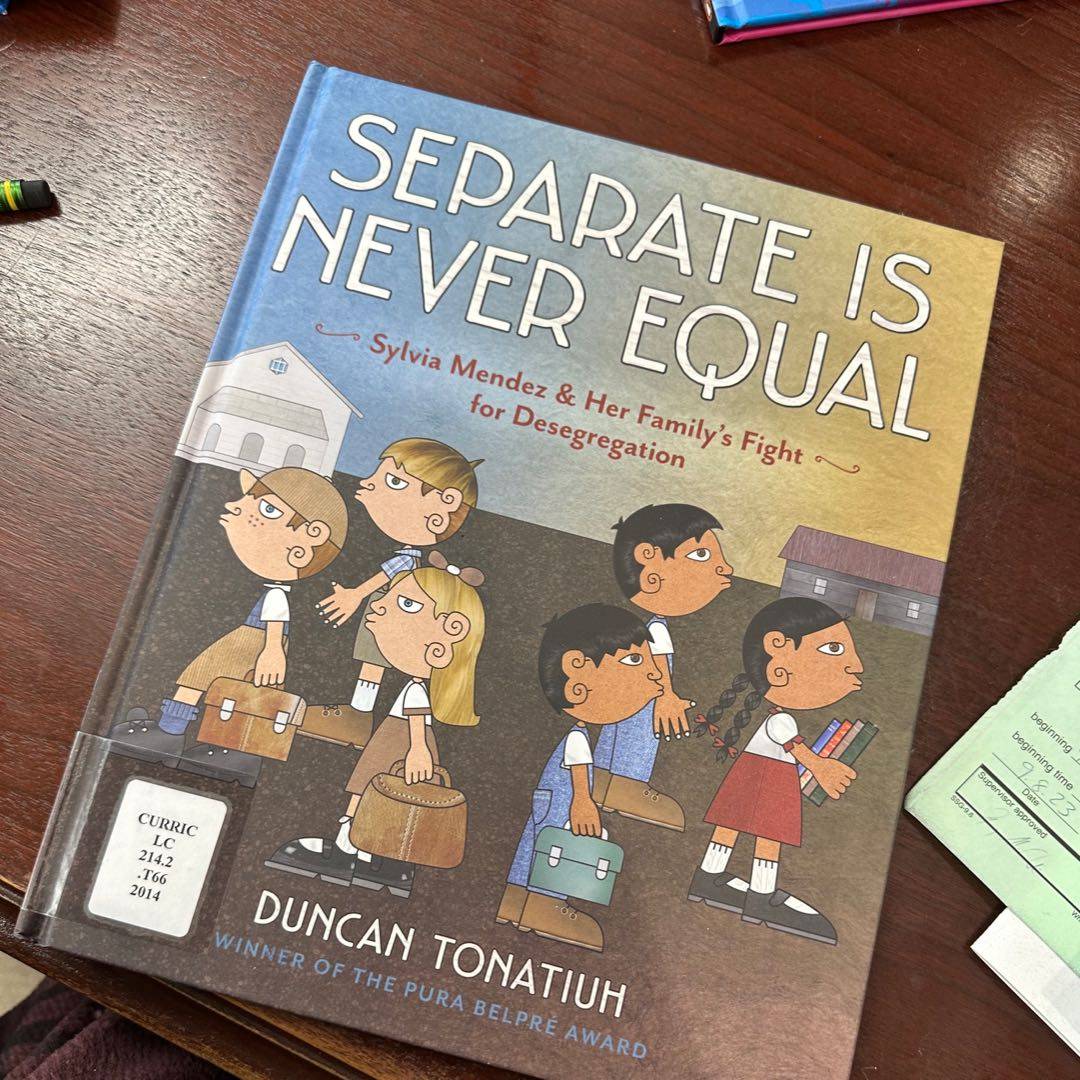
⭐⭐⭐⭐5⭐
This book is a fabulous look at Sylvia Mendez and what her family did to fight segregation in California. Most students and kids learn about the court case of Brown versus the Board of Education, which desegregated schools nationwide. Years before that landmark case, the Menendez family did the exact same thing for their local Orange county community. This led to California becoming the first state to have a law against school segregation.
“ segregation tends to give an aura of inferiority. In order to have the people of the United States understand one another it is necessary for them to live together”
Separate is never equal is a book about a young girl who was denied access to a school because of her skin color. Her parents rallied the local Hispanic community. they filed a lawsuit, and eventually this led to the end of school segregation in California. This book takes you back to a time when just because of skin color you could be denied from anywhere.
Separate is Never Equal is a book that takes place 10 years before Brown vs. Board of Education. A girl who is an American citizen of Mexican and Puerto Rican decent takes on segregated education in California. Sylvia was denied access to a whites only school so her family decides to stand up for what‘s right.
This nonfiction story is very touching as a young girl who is excited about attending a local school. Come to find out she and her siblings end up being turned away. They are told to enroll in a Mexican school instead, even though she is an American citizen who speaks fluent English. The girl's family is so upset by the school's response that they decide to file a lawsuit. Ultimately helping end school segregation laws in California in the 40s.
Separate Is Never Equal written and illustrated by Duncan Tonatiuh was published on May 6th, 2014. This story is a biography and won the Robert F. Sibert Informational Book Award. Separate Is Never Equal tells the story of how Mexican-born Gonzalo Mendez and Puerto Rican Felicitas Mendez challenged the separate and unequal school system in California.
When moving to California, Sylvia Mendez was excited about enrolling into her new school. Instead, her and her brothers were told to enroll into an all Mexican school. This confused Sylvia because she was an American citizen who spoke clear English. This story tells us about how the Mendez family brought efforts forward to bring an end to segregation, eventually leading to Brown v. Board of Education.
Sylvia Mendez is a young girl who moved to California with her family. When her and her brothers tried to enroll into the neighborhood school, they were denied entry. They were told they needed to go to an all Mexican school instead. This was confusing for her and her family. Her family took control of the situation and organized a law suit. The Mendez family helped bring segregation to an end in the California school systems.
This book describes the story of how seven years before Brown v. Board of Education, the Mendez family fought to end segregation in California schools.
Awards won: Carter G. Woodson Book Award
Purpose of Award: Encourage the writing, publishing, and dissemination of outstanding social science books for young readers that treat topics related to ethnic minorities and relations sensitively and accurately
Author: Duncan Tonatiuh
This book tells the story of how Gonzalo Mendes and Felicitas Mendez challenged the separate but unequal school system in Califonia. Gonzalo was Mexican-born and Felicitas was Puerto Rican. The story takes place during World War II. The book highlights Mendez v. Westminster desegregation case in Califonia that came before Brown v. Board. The book highlights how Mendez organized leading up to the case and during it as well.
Author & Illustrator: Duncan Tonatiuh
Award: Pura Belpre Award (2015)
Genre: Biography/ Nonfiction/ Picture book
Publication: 2014
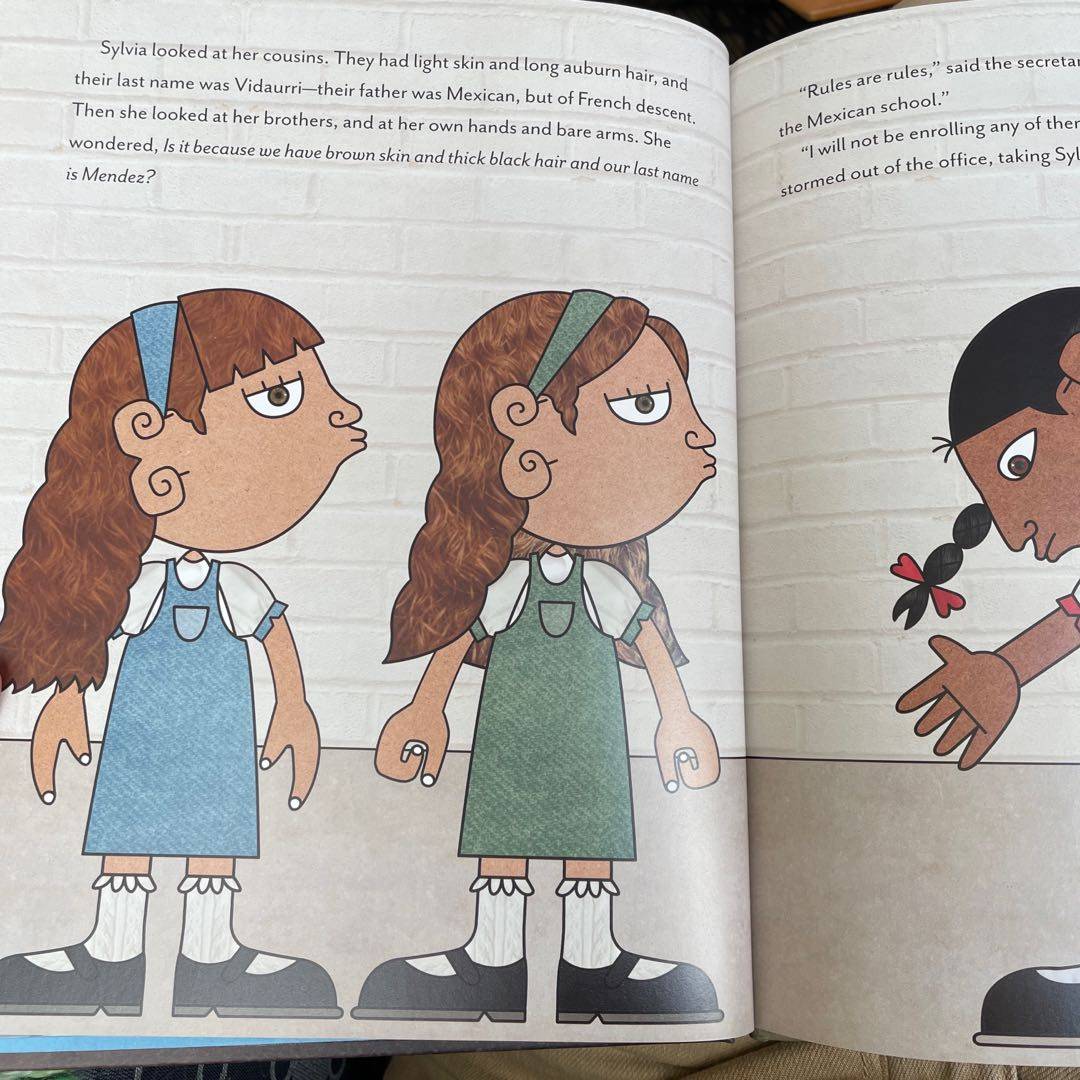
“Sylvia looked at her cousins. They had light skin and long auburn hair, and their last name was Vidaurri- their father was Mexican, but of French descent.”
This quote made me sad, thinking about a little girl comparing her skin and wondering if she cannot gi to this school because her skin is darker and her name is of a Mexican descent. This is clarity that they really just judged off their skin color, considering those are her cousins!
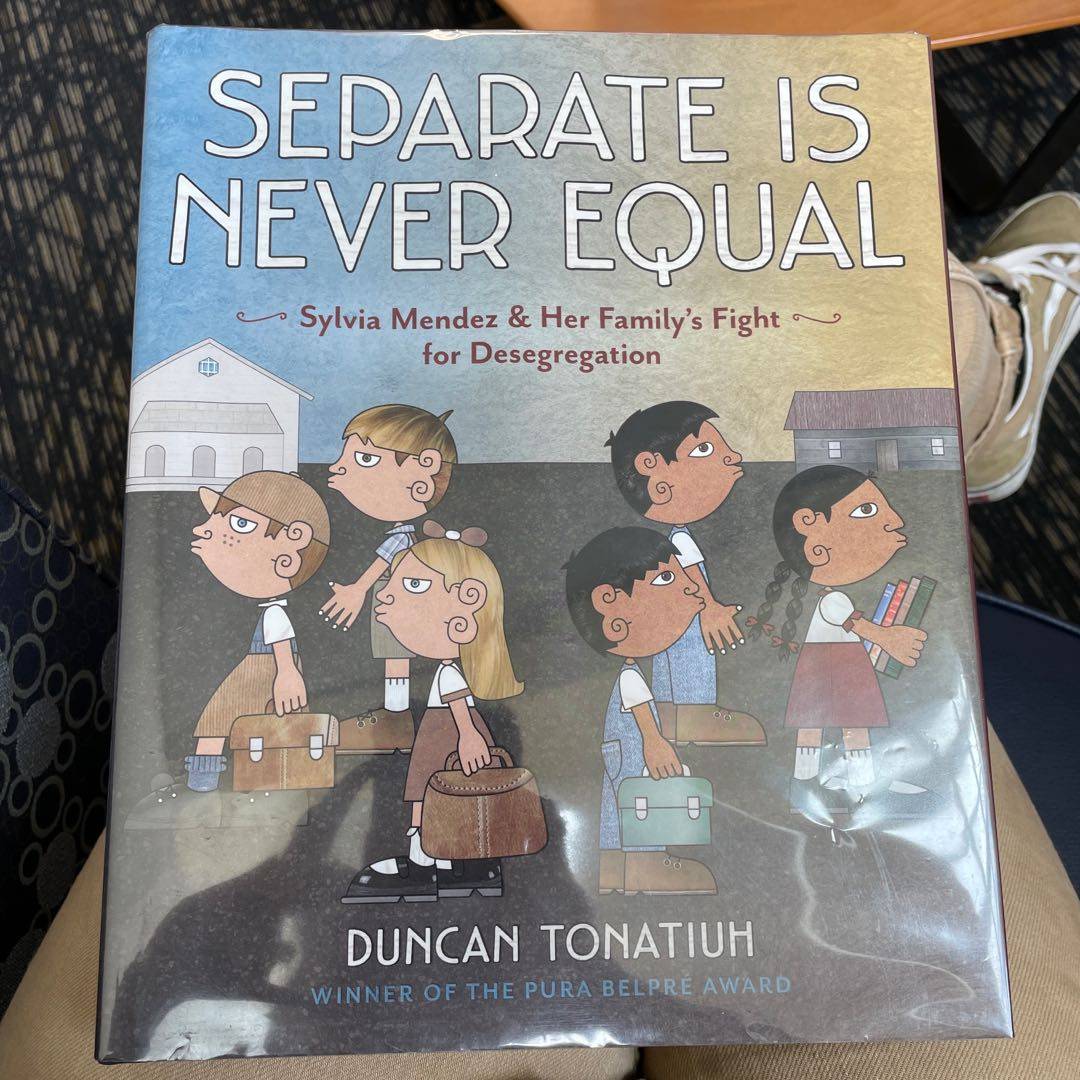
This book is phenomenal, and it would be a good read in the classroom. To show the history of Mexicans and what they had to do, to just come to school. This also shows how lucky we are that these families fought for the right for us to learn together. The value of inclusion is so important. Also at the beginning the daughter Sylvia was made fun of at her new school for being Mexican, but she has to remember, this is what they fought for.
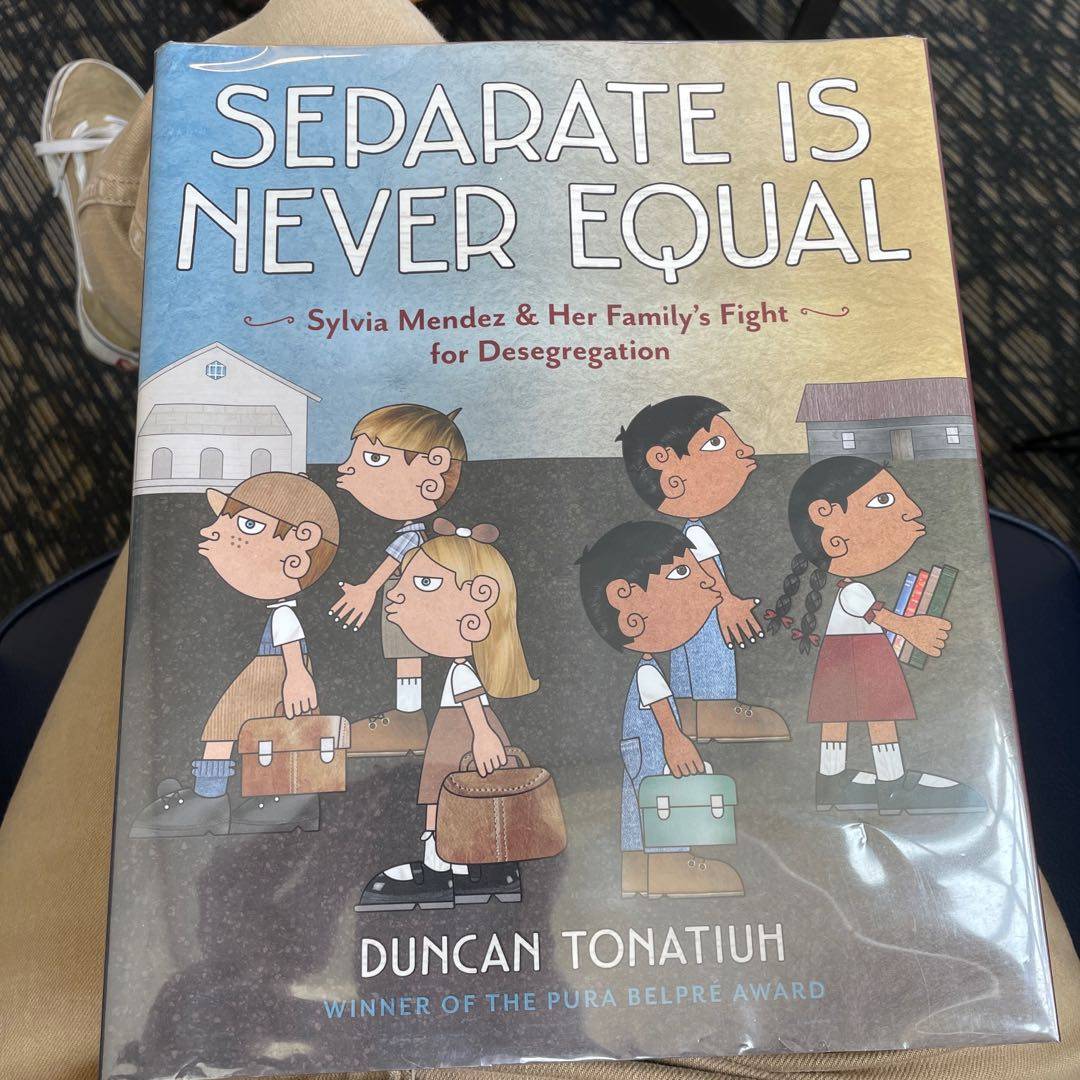
Winner of a Pura Belpré award, Separate is Never Equal is a very enlightening book. Its about a Mexican family looking to enroll in the closest school to their house and not being aloud because they are Mexican. There father took it to court with a lawyer and eventually the whole state of California creating a law that children of any race,ethnicity and culture are allowed in any school.
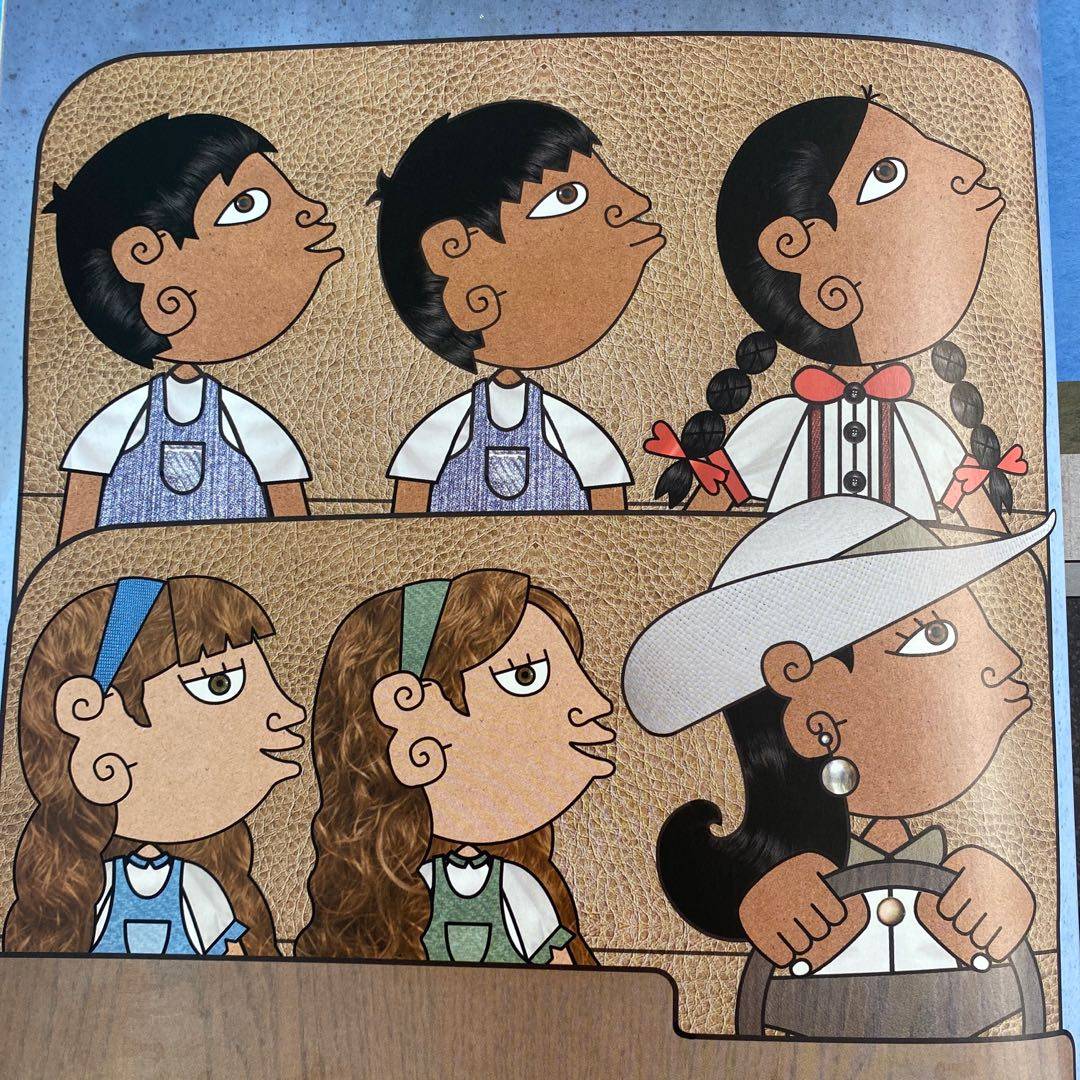
What I loved so much about this book is the art that when with it. They are drawings but the textures are actual pictures. For example, the hair is outlined but a picture of real hair. They do this for most of the textures and I‘ve never seen it down before, it‘s so cool!
I liked this book a lot because it shows the importance of everyone. I think a lot of times in schools we want to focus on diversity and really hone into black history month and black heroes. While that is amazing, we also need some representation in other races as well and this book does that and includes some really awesome things they accomplished.
Separate is Never Equal by Duncan Tonatiuh 2014. This book takes us through the journey of the historical fight for equal rights among Mexican children. The child and her family were upset that they could not attend the same school as the other kids and were referred to apply at the Mexican school. Sibert and Pura Belpré.
“This time she did not listen to any whispers. She ignored the children who pointed at her and called her names. Instead, she held her head high. Her parents fought not only for her and her brothers but for all their classmates.” p.34
The author‘s note and real pictures of Sylvia and her family really connected with me as a reader. The story was powerful, but knowing that these things happened to real people and real families makes their fight for desegregation in schools so much more powerful. It‘s interesting to know more information about them and the trials.
Sibert Honor and Belpré Honor, published 2014. This book told the story about a young Mexican girl and her family who moved to a new town. They were turned away by the neighborhood school and told they had to attend the Mexican school. Their family fought to bring and end to segregation in schools. This book is very empowering and very educating on Brown v. Board. Great book for older grades.
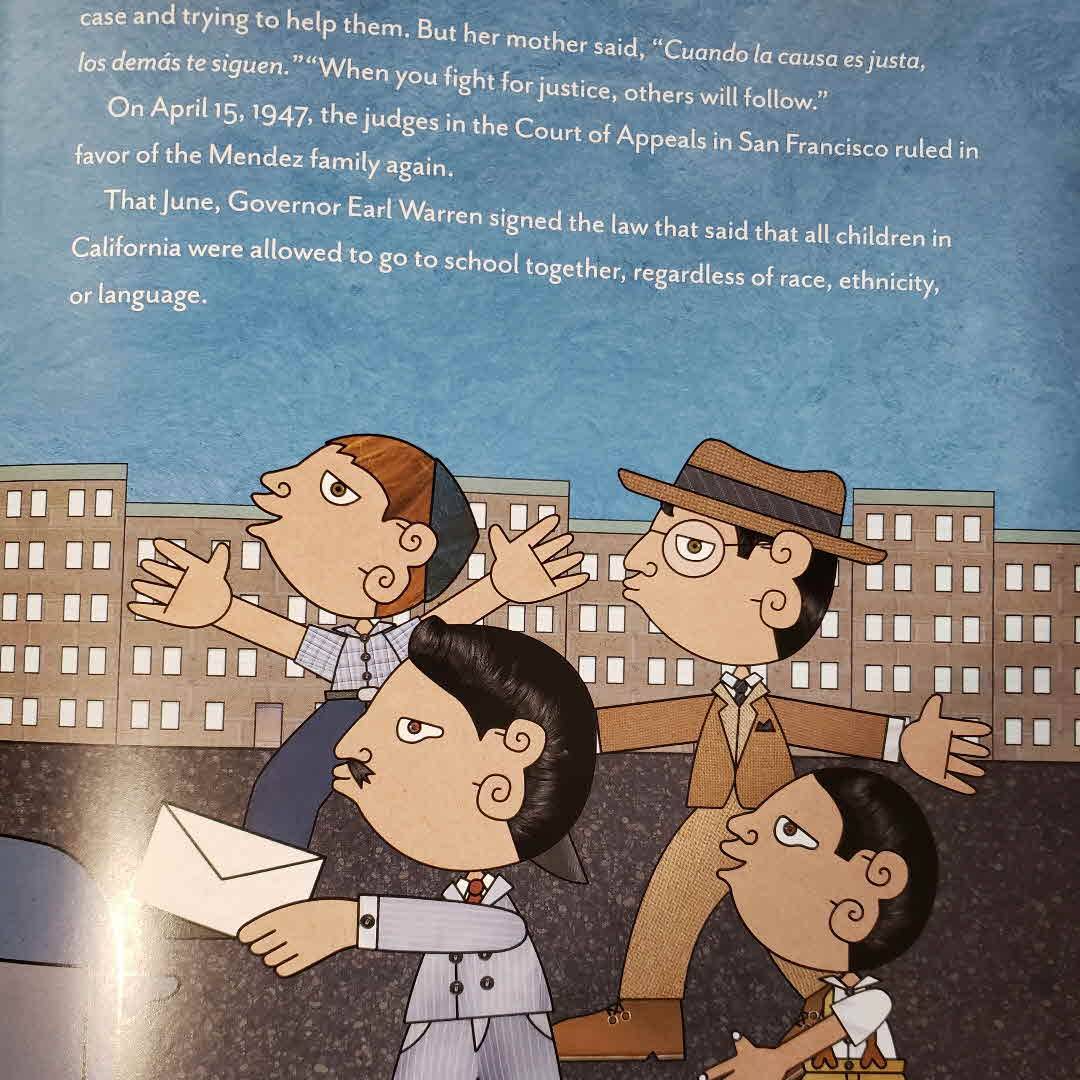
“Cuando la causa es justa, los demas te siguen.“ “When you fight for justice, others will follow.“
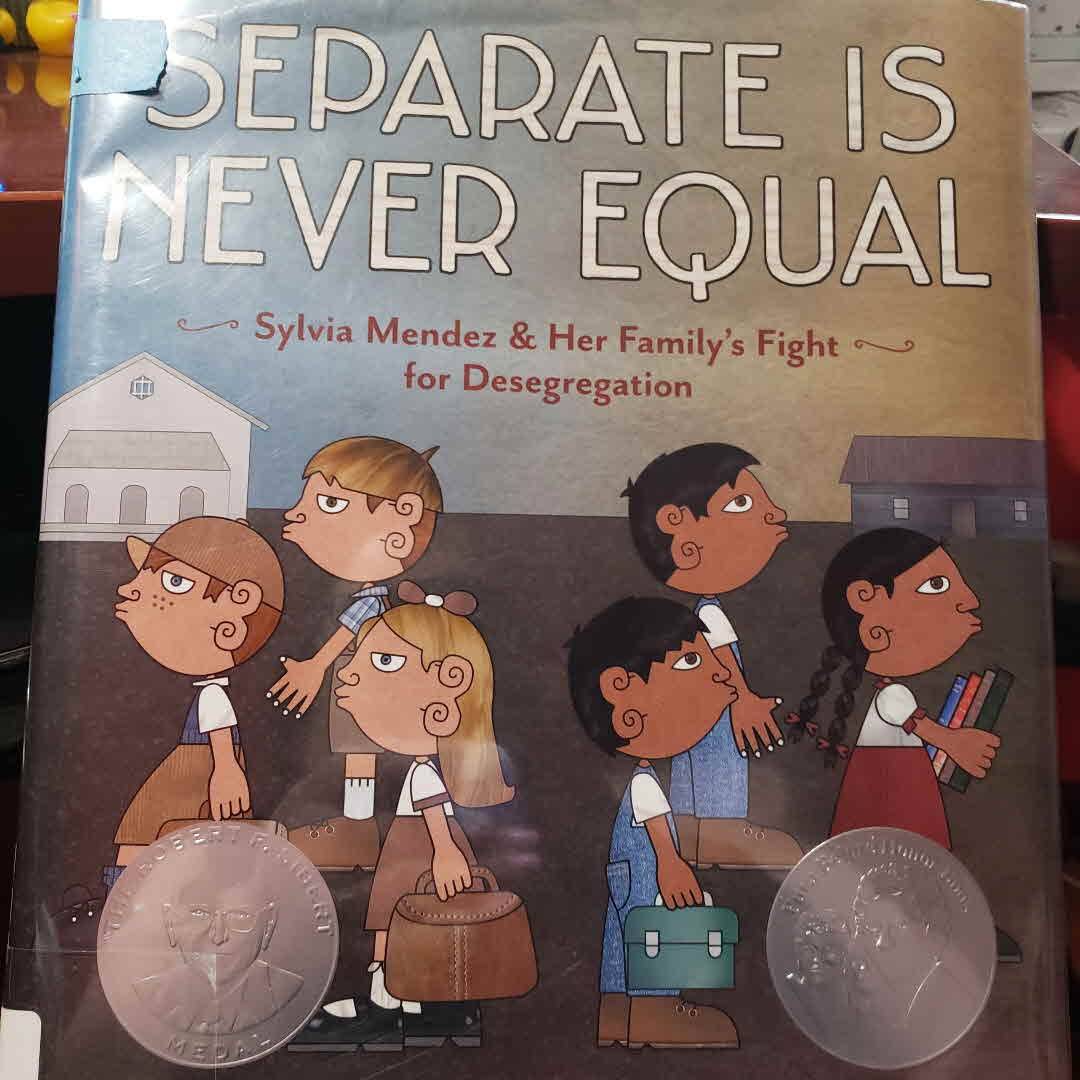
Like most Americans, I knew about Brown v. Board of Education; but, I had never heard of the earlier case Mendez v. Westminster School District. This was an excellent children's picture book about the Mendez case, including a more comprehensive Author's Note at the end for adults.
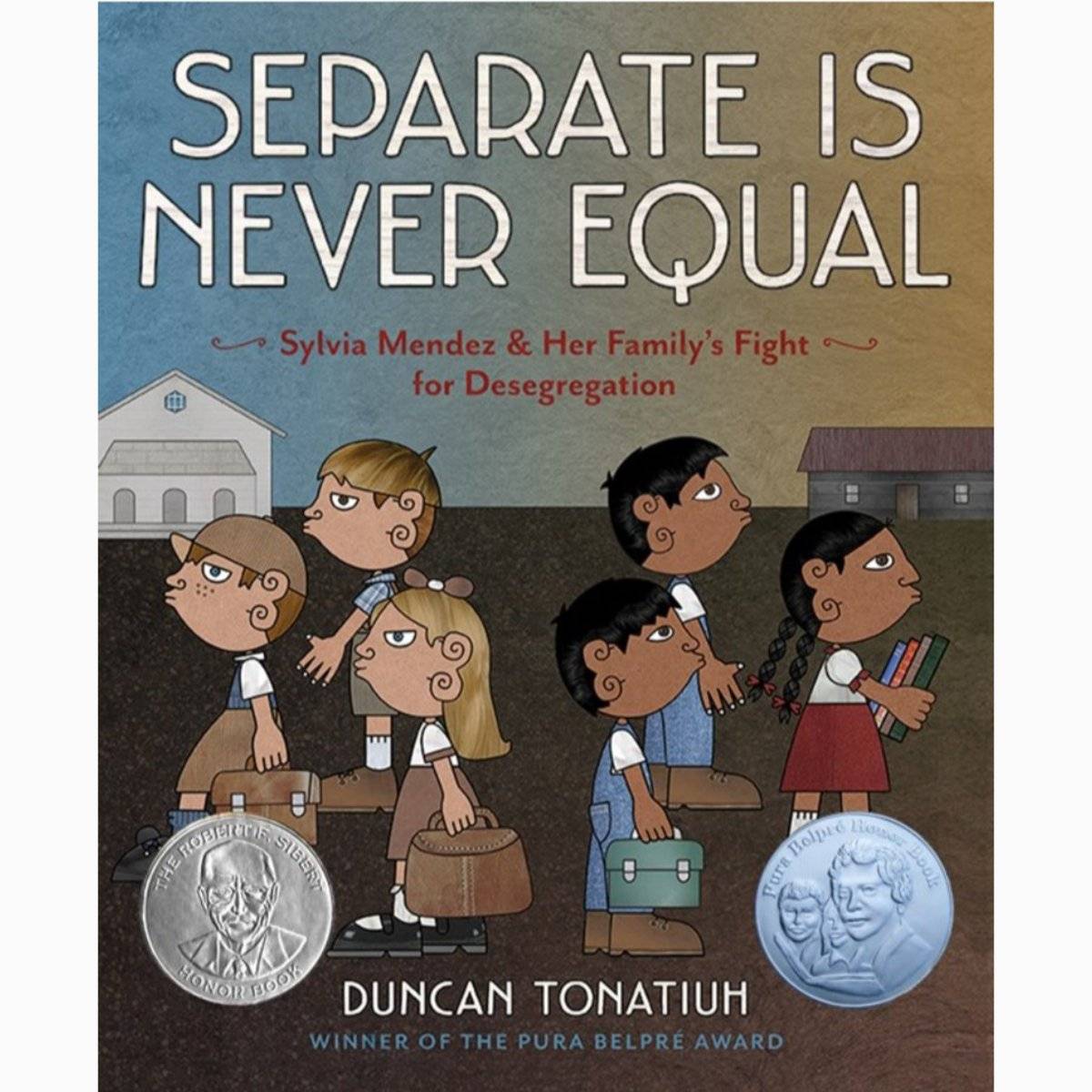
Separate Is Never Equal by Duncan Tonatiuh is a NF book that has received the Jane Addams award. The story details the struggle of the Mendez family as they combat discrimination and fight against segregation so Latin families and others can have a right to a fair education. This book is great to begin an AS with Tonatiuh's other literary works.
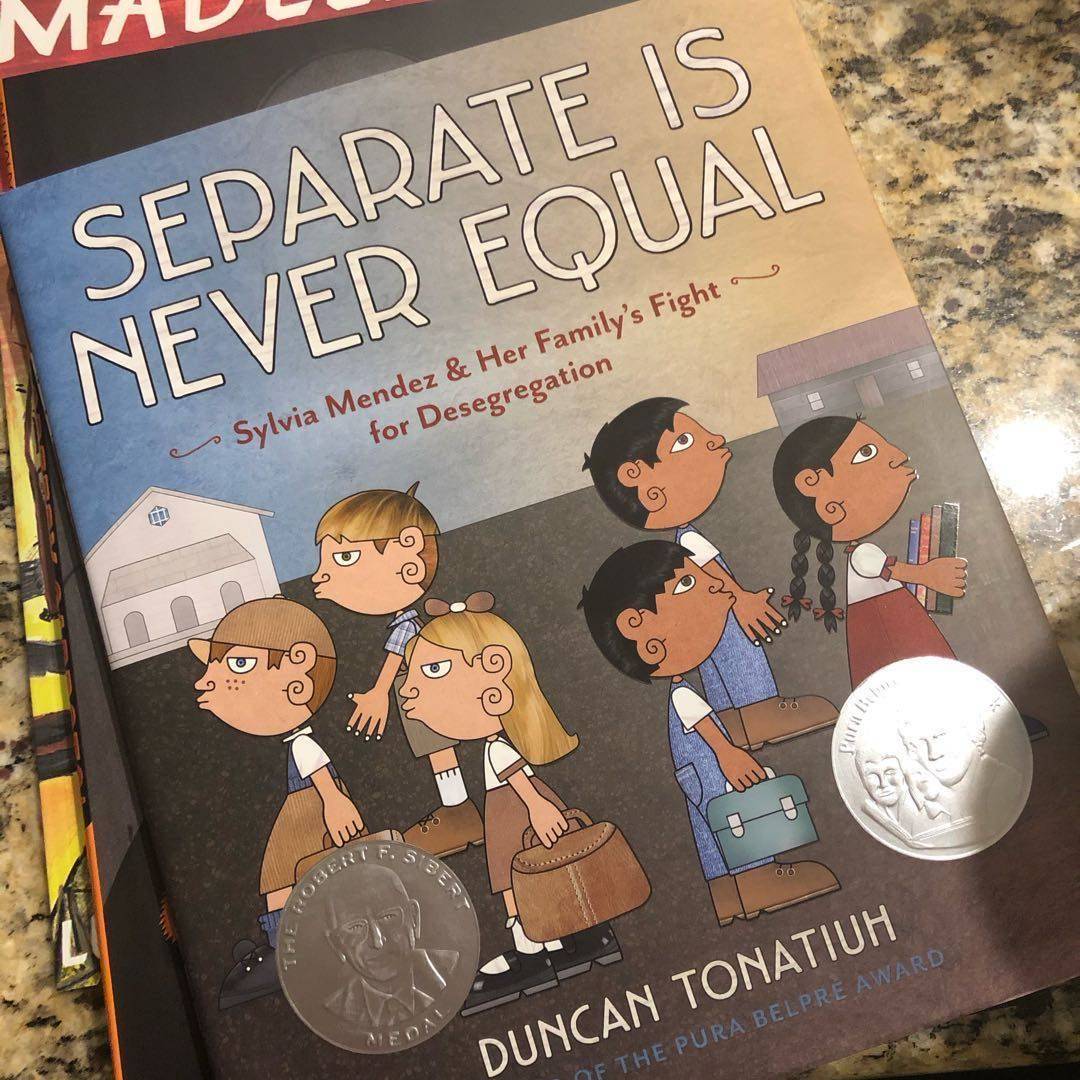
This NF book is a Pura Belpre honor book, and the Sibert award winner. It is a story about Sylvia, who‘s family immigrated from Mexico to the USA for a better life. When they go to enroll in school, they‘re told they must go to the “Mexican school”, and never given a reason why. Her father fights with all his might and in the end, he wins so students of all races can go to whatever school they want. This is a powerful message to be shared in a RA.
“When you fight for justice, others will follow.”
I will use this book in a classroom read-aloud because it can inform children about how people had to fight for segregation and how we can learn from this book. It also will be a tool for me when talking about racism.
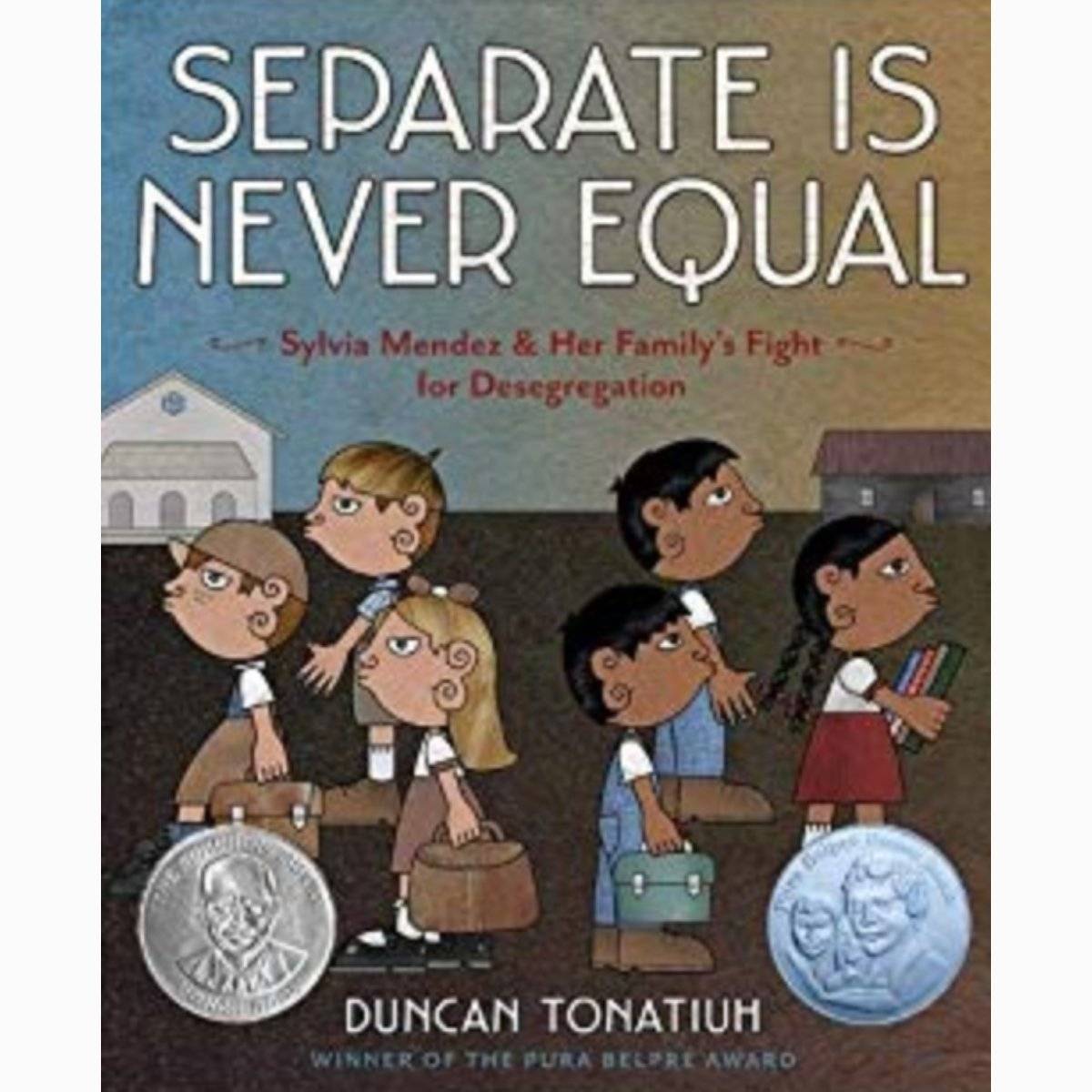
I absolutely love this book and I think it is so important for children to learn about the history of our country. This is a good nonfiction book because generalizations are supported by facts and the facts are accurate.
“The mendez children have to go to the mexican school“
This book would be great for older elementary students because the subject is more complicated to understand. Students may need to have a background of the story before reading the story to help them.
This is a nonfiction children's book. The facts in this story can be accurate because of things that have happened in the past. The story is structured very clearly and gets the stories point across.
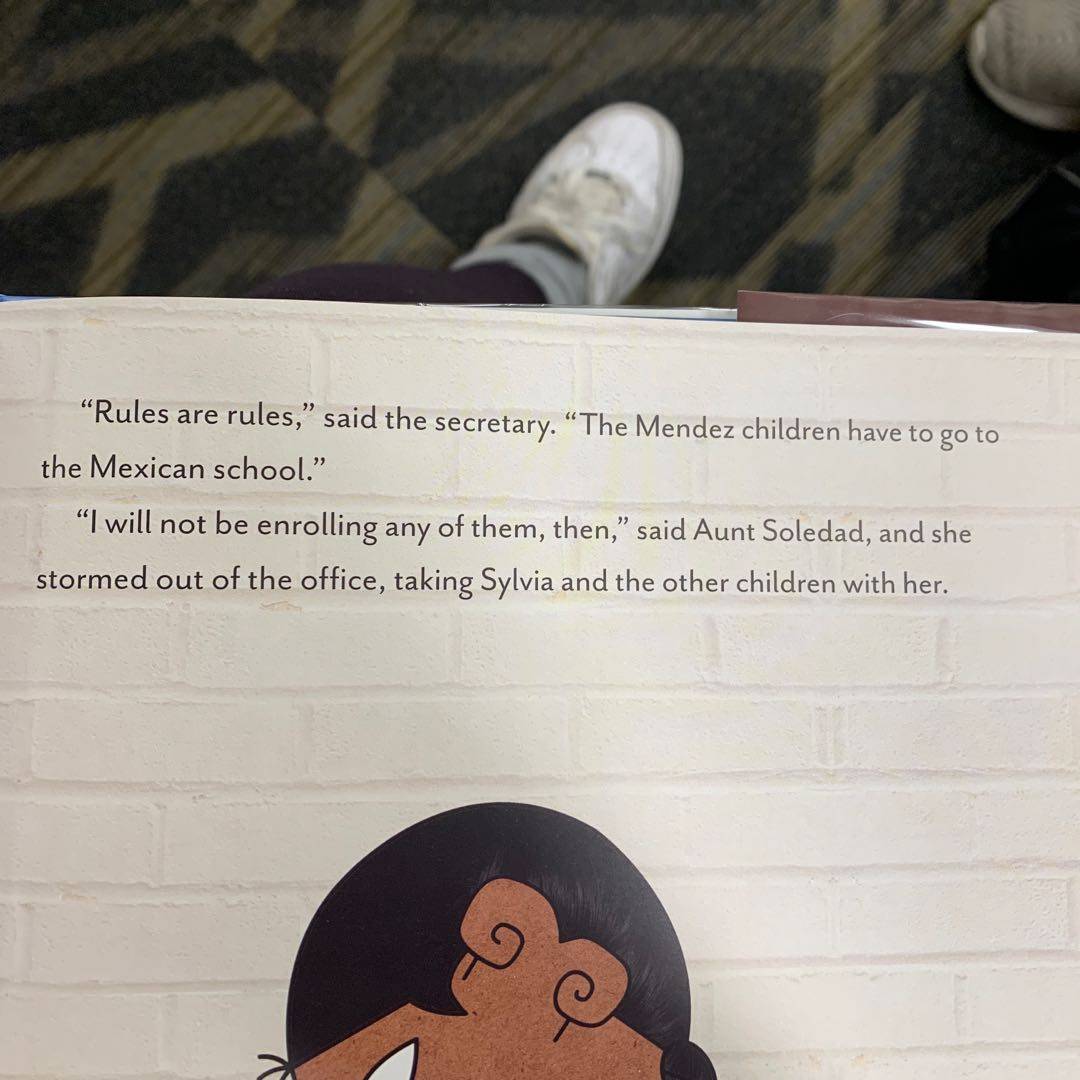
“the Mendez children have to go to the mexican school” This part of the book was so sad to me and influenced the rest of the book
This is a good example of nonfiction, it tells a story that children need to know and is good education for them